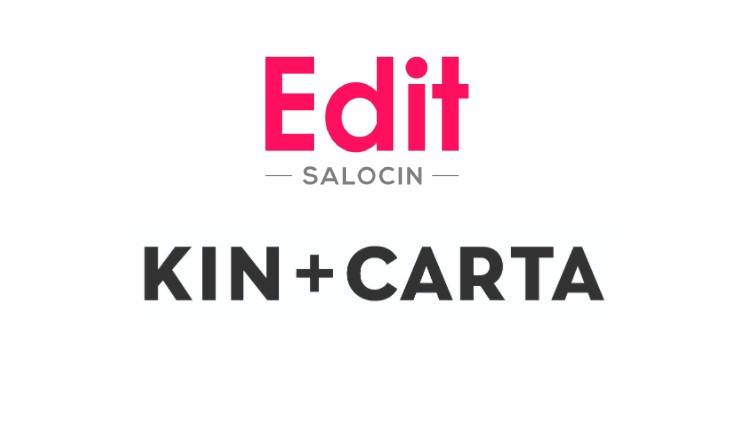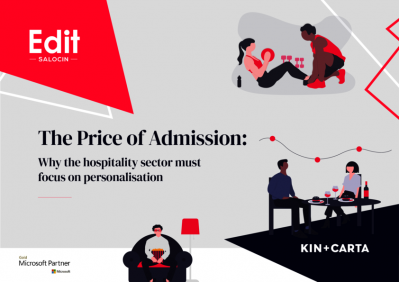Promotional Features
Why personalisation is a must for the hospitality sector
Most key business decisions in hospitality ultimately link back to either capacity, demand, or price – or more precisely, the ability to balance all three. For example, with too little capacity, customers are forced to wait longer in queue or – worse still - turned away from a restaurant.
This is frustrating and often impacts customer retention. But, without demand pressing up against capacity, it’s a challenge to make money – which in turn impacts price. To counter this, the industry has traditionally resorted to incentives like seasonal deals and 2-for-1 offers, but such mechanisms lack personalisation and cannot drive long-term customer engagement.
But – as Edit & Kin + Carta’s report The Price of Admission reveals – many opportunities to deliver more tailored experiences through good data collection have been missed in the hospitality sector as, post-pandemic, venues revert back to their old ways, focusing on acquisition and not retention.
The regulations imposed on the industry provided a net through which businesses could catch far more data than before – not least through online ordering and payments.
Understanding the problem
The struggle with data collection is prevalent in many businesses irrespective of their size. National chains collect a lot of data across the customer journey but because of siloing and a lack of resources it can’t be effectively analysed.
Small businesses, on the other hand, often don’t have the resources to effectively collect the data in the first place, let alone analyse it. Big or small, every hospitality business needs to focus on their value exchange and make it clear to their customers that the data they collect is used to deliver better service.
Only by capturing quality data can analysis be performed, and actionable insight gained. Without actionable insight, businesses will continue to struggle to keep up with demand. “There is a clear split in the market.
Big enterprises can capture data but struggle to know their customers at scale,” says Gary Arnold, Customer Data Director at global digital transformation business Kin + Carta. “Small companies know each customer who walks through the door, but they can’t capture and utilise the data effectively because they don’t have the mechanisms in place.”
Capturing data the right way
Companies that do understand the value of data need to capture it in a way that is friction-free. This is where value exchange in data becomes important – the idea that, in order to make a service more personalised and relevant to an individual, you need to know more about them.
“People want to navigate their journeys based on who they are. Now, more than ever before, people are travelling and experiencing hospitality in a more purposeful way, with an expectation of the levels of personalisation they experience online to translate to the real-world,” says Shane O’Flaherty, the Global Director for Travel, Transportation and Hospitality at Microsoft.
Yet industry tactics haven’t evolved much beyond discounted meals or buy-one-get-one-free vouchers. And once these discount model have been introduced it can be very difficult for businesses to change the perception of their company. This is why creating the right data collection strategy is vital.
Hospitality venues struggle to justify the cost of implementing on-site technology that can more effectively collect customer data. Many POS devices are now capable of scanning QR codes or membership cards – but the cost of rolling out infrastructure of this magnitude across large sites is prohibitive; in part because of the thousands of separate devices that are already in play.
A classic example of a sector navigating data capture issues is the casual dining space. For example, when a customer logs into a restaurant’s Wi-Fi, that business has an opportunity to capture that and connect it with another data point.
It could make the connection that that diner spent £200 and had the meal with three other people – but is that really the best way to glean insight? If a business could instead understand why that booking was made or if the diner enjoyed the meal that could be far more valuable. This is an example of where businesses miss an opportunity to personalise more effectively.
Anna Gieniusz, principal solution consultant at MarTech Edit says that personalisation is most effective when it’s part of the service. “It's part of the physical experience and the customer journey,” she continues. “Not just personalising the offers that customers have in their apps but also giving the staff the opportunity to add additional value based on the insight that have at their fingertips.”
Effective analysis
In the case that bigger enterprises have managed to capture a good quantity of quality data and can attribute it to individual customer profiles, they often fall at the next hurdle – effective analysis.
“Hospitalities biggest gains can be made when they use data to develop bespoke customer journeys. For venues and operators, the emphasis should be on delivering a personalised level of value exchange. The more they know about their customers the better they will become at creating experiences that increase visit value and keep their clientele returning,” says Rob Donofrio, director and business applications specialist at Microsoft.
Although the challenges discussed are hampering the reinvigoration of the hospitality sector, there are solutions. Combining technology with expert-led strategy and using the data already available to build a better user experience allow businesses to double-down on the true value of personalisation.
While there’s no ‘quick fix’ for the problems hospitality faces, change can happen sooner rather than later. Many of the big national chains already have a wealth of data available and should be asking themselves what they can do with what they have currently.
The answer lies in assessing the potential of the data to better understand customers before taking steps to bring that data together.
More data capture opportunities
The pandemic has reduced contact between all of us, but with this challenge came opportunities. In hospitality, many habits adopted around the use of technology have streamlined experiences which, when leveraged correctly, can now be used as data capturing opportunities.
With deeper profiles of customers available, additional information is not only visible, but it can also be linked and used for additional profiling and segmentation. Knowing more about the customer is an opportunity to identify what not to target them with. For example, sending a vegan customer an email about a steak night doesn’t just miss the mark – it’s a clear indication that the hospitality brand isn’t paying attention to their custom.
The hospitality sector finds itself at a crossroads. Socially, after long periods of isolation, people want to reconnect with one another, face-to-face, and enjoy new and old experiences together. This is a pivotal moment because the organisations that focus on those very people, and what they seek, will be the ones that succeed.
Personalisation offers the chance to improve brand loyalty, incremental spending, off-peak demand – so many of the challenges that hospitality has always battled against. Tracking how a person books and then interacts with sites, staff, and the rest of their party and putting those things together to create an intelligent profile is how separation will begin to occur in the market.
Once that first step has been taken, it will lead to the actionable insight that will give marketers the opportunity to optimise customer journeys and give more value with each customer interaction.
No single action or effort will make the difference. It is going to take a truly forward-thinking outlook to bring together the required technology, strategic competence, and the skill to collect and interrogate data and action its insights. Using the right tech is the first step. Ignoring it will leave organisations in the dark.
Focusing on personalisation
Download Edit & Kin + Carta’s The Price Of Admission report here to understand how hospitality venues, can gain the upper hand in an intensely competitive environment via increasing personalisation across all of their communications, in person and online.
Key areas include:
- The main challenges the hospitality industry is facing
- General marketing challenges
- Data specific challenges
- Personalisation specific challenges
- How a customer data platforms can solve these challenges
- How customer journey optimisation can provide a better visitor experience
- Specific advantages of the Microsoft tech stack for the hospitality industry
If you wish to discuss the findings of the report with a specialist hospitality consultant, please contact uryyb@rqvg.pb.hx


